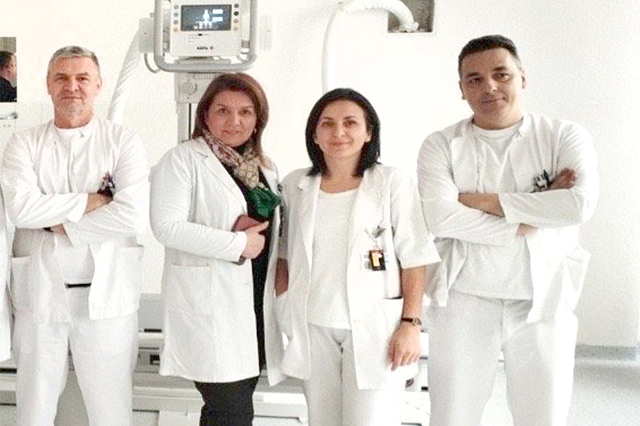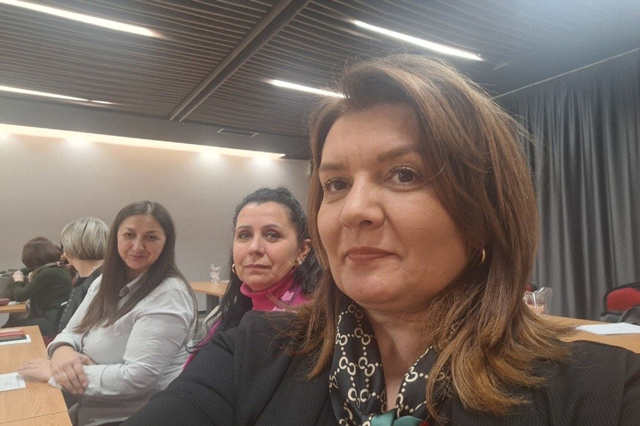
Vernesa Saric is the Assistant Director for nursing at Primary Health Care Center Zenica. From her professional beginnings during the war, to the position of nurse leader in one of the largest health institutions in Zenica-Doboj Canton, she worked at all health care levels, building a career on knowledge, dedication and love for the job she does.
When and where did you start your career? I started working as a nurse in 1993, at Primary Health Care Center (PHCC) Zenica, right after graduating from the nursing high school. The war was on, I was only 19 years old, but I knew that I wanted to help people. Since then I have remained faithful to this institution and this vocation. I have always had a strong empathy for people and a desire to do something humane and useful. Medicine attracted me even in elementary school. I was a good student and when the time to enroll in high school came, I chose nursing high school. I have never regretted it!
Describe a working day... Given that PHCC Zenica is the largest PHCC in Zenica-Doboj Canton with 485 employees, each day is very dynamic and challenging for me. I start working day with regular morning meetings with the Director and Assistants, followed by coordination with different departments, solving emerged issues in order to timely provide information and better functioning of the departments. There is also a field work, which includes regular visits to our departments and 28 family medicine clinics.
The position of nurses in Bosnia and Herzegovina... Being a nurse in Bosnia and Herzegovina is both beautiful and difficult. Nurses play a key role in providing healthcare and make an invaluable contribution to the well-being, safety and recovery of patients. They are professionals who should be praised. Due to a lack of staff and administrative burdens, they cannot devote themselves sufficiently to their profession. Above all, they have recently been increasingly facing verbal and even physical harassment at the workplace.
Shortcomings and necessary changes... Nowadays, in almost every healthcare facility, the greatest problem is the shortage of staff. There are still many challenges for nurses at the labor market, including inadequate recognition of their role in the healthcare system. In PHCC Zenica, there have been lots of changes and improvement in the last few years. By acquiring adequate equipment and materials for work we thrive to improve the work of our services on daily basis, as well as working environment. I would like nurses to be given the key roles in the near future through additional trainings and nursing specialties, which should be attained by harmonization of the Directive on Standards and Norms in Healthcare, as well as other public health acts in the Federation of Bosnia and Herzegovina.
Challenges in everyday work... We can say that one of the biggest challenges in nurses’ practice is exactly the job itself, that is, the duties they have to perform. Just like in many other professions, there is an increasing number of duties and tasks in healthcare that must be performed within one working day. Nurses have defined tasks within the set plans, but their work is unpredictable. This means that nurses often have to ignore all pre-set tasks and respond to patients or team members in need.
Support from society and institutions... I believe that society should show a little more empathy and respect to health professionals and understand what they do. Patients have their rights but also obligations and procedures to follow and respect. Quite often conflicts arise precisely due to non-compliance with procedures. Institutions should do much more to ensure the safety, sustainability and acknowledgment for the work their health professionals do, bearing in mind their profession, dedication, sacrifice, commitment and readiness wherever they are.
The importance of the nurse-patient and nurse-doctor relationships... As in any profession, relationships in a healthcare team are important; even more so in this profession. The nurse is obliged to establish a partnership with the patient, his family and colleagues in order to achieve the best possible treatment outcome. In that sense, open communication and understanding between the nurse and the patient are necessary. Some nurses are more and some less successful in establishing partnership with the patient. It depends on the emotional and social intelligence of both the nurse and the patient. The responsible nurse has only one goal, to help the patient. Speaking of nurse-doctor relationship, the doctor is responsible for the work of the entire team and the coordination of all members in it and has a significant influence, which is also conditioned by the good communication, resulting in the greatest benefit for patients. Respect among the team members is important as well as the right to freely express their opinions. Mutual respect and appreciation are the basis for successful cooperation.
How did the Covid-19 pandemic affect the status and role of nurses... The global COVID-19 pandemic has tested healthcare systems around the world. The importance of the nursing profession has come to the fore, as it was nurses who showed all their creativity and persistence in the fight for people’ health. The modern era and the dynamic technological development in medicine require the introduction of innovative solutions and become the foundation of quality nursing care. A prerequisite for the progress and development of the nursing profession is a combination of determination, resilience and passion for achieving personal or professional goals. The importance of continuous education for nurses, as well as achieving high academic degrees, is unquestionable, leading to increased efficiency and shaping professional identity, thus preparing them to manage crisis situations. Thanks to the dedication, hard-work and professionalism of our nurses, PHCC Zenica showed a good response in Covid-19 pandemic. Today, when everything is behind us, one might get the impression that all that effort has been forgotten, but I think that our citizens have recognized the importance of nurses and they realized that they have true heroes who will always be by their side, in the worst moments.
Working conditions in the private and public sectors... Working conditions are not and cannot be the same at all places. They are different in public and private institutions. I believe that nurses, regardless of the institution they work at, should give their best to perform their work. I used to work in a private health sector, so I can say that both, private and public, have their advantages and disadvantages. These differences can only be understood by those who were in the private sector and moved to the public sector or vice versa. I believe that nowadays it is more difficult in the public sector, while the conditions in private sector are improving year by year, all due to the lack of workforce and outflow of young people who no longer wish to work for the salaries paid to nurses in Bosnia and Herzegovina. The private sector may be in the lead when it comes to the working environment and equipment, but nurses are more overwhelmed because they have more different tasks, while nurses in the public sector have precisely defined job description, regulated use of annual leave and work on public holidays, and continue with professional development.
How developed is the educational system for nurses in BiH... The educational system for nurses in Bosnia and Herzegovina is developed, but it is not quite aligned with the needs of health institutions. It would be of great significance to follow the needs of the labor market, so that we do not have hyper production of certain professions, which are not recognized and defined by the existing standards and norms. It would be desirable to have practical and theoretical studies both in secondary and higher education programs, just like it is done in Western countries; first to complete the theoretical part in school then follow up with practical part in a health institution. This is the only way we can get well-trained and educated nurses that will be skilled professionals after graduating from high school or college. In addition to that, it would be good to introduce incentive payment as a good motivation for work, improvement and acquired knowledge and skills. I believe that Bosnia and Herzegovina has good resources to carry this out. It just needs to find a good systemic solution for its implementation. Also, it would be valuable to introduce nursing specialties.
The importance of Strengthening Nursing in BiH project... Fami Foundation, in cooperation with entity ministries of health and with the support of the Embassy of Switzerland in BiH, places great importance on the improvement and development of the nursing profession. Through various types of trainings, lectures and workshops, it helps improve and enrich the nursing profession, providing nurses with new knowledge, skills and competences, that will ultimately result in the provision of improved health care services. Thanks to Fami Foundation, PHCC Zenica has well-educated nurses who are lecturers, trainers and mentors, and who continuously pass on their knowledge to other nurses in our Educational Center, which would not be what it is nowadays without them.
A message to future nurses... I would lie to tell young people that this is a wonderful and humane profession that not everyone can do. A profession that requires lifelong learning, commitment, dedication, effort, sacrifice, empathy, courage, moral, respect for diversity and understanding. If they recognize themselves in all of the above and love that vocation, then they can become real professionals who will do what they love, help others and get paid for all that.



